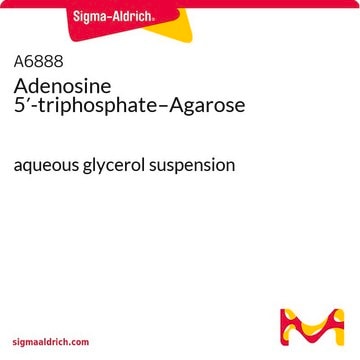A2767
Adenosine 5′-triphosphate–Agarose
lyophilized powder
Synonym(s):
5′-ATP agarose
Sign Into View Organizational & Contract Pricing
All Photos(3)
About This Item
Recommended Products
biological source
plant (Sea weed)
Quality Level
form
lyophilized powder
extent of labeling
1-5 μmol per mL
matrix
cross-linked 4% beaded agarose
matrix activation
cyanogen bromide
matrix attachment
C-8
matrix spacer
9 atoms
storage temp.
−20°C
Looking for similar products? Visit Product Comparison Guide
Related Categories
General description
Adenosine 5′-triphosphate–Agarose (5′-ATP-agarose) is a conjugate of 5′-ATP to crosslinked 4% beaded agarose (activated by cyanogen bromide), via the C-8 atom of 5′-ATP. 5′-ATP–agarose is applicable for affinity purification of various proteins and enzymes like cyclin-dependent kinase 2 (CDK2), heat shock proteins, and cryptochromes.
Application
Adenosine 5′-triphosphate Agarose (5′-ATP agarose) has been used in affinity chromatography to purify uridine kinase from Ehrlich ascites tumor cells.
Adenosine 5′-triphosphate–Agarose (5′-ATP–agarose) is applicable for affinity purification of various proteins and enzymes like cyclin-dependent kinase 2 (CDK2), heat shock proteins-70 (HSP-70), and cryptochromes. 5′-ATP agarose has been used in affinity chromatography to purify uridine kinase from Ehrlich ascites tumor cells.
Physical form
Lyophilized powder stabilized with lactose
Storage Class Code
11 - Combustible Solids
WGK
WGK 3
Flash Point(F)
Not applicable
Flash Point(C)
Not applicable
Personal Protective Equipment
dust mask type N95 (US), Eyeshields, Gloves
Certificates of Analysis (COA)
Search for Certificates of Analysis (COA) by entering the products Lot/Batch Number. Lot and Batch Numbers can be found on a product’s label following the words ‘Lot’ or ‘Batch’.
Already Own This Product?
Find documentation for the products that you have recently purchased in the Document Library.
Customers Also Viewed
J E Braun et al.
The Journal of biological chemistry, 271(42), 25989-25993 (1996-10-18)
Cysteine string protein (CSP) is a 34 kDa secretory vesicle protein bearing a "J-domain" as well as a palmitoylated cysteine-rich "string" region used for membrane attachment. Mutation of the CSP gene causes impaired presynaptic neuromuscular transmission in Drosophila melanogaster, implicating
E T Bui et al.
Proceedings of the National Academy of Sciences of the United States of America, 93(18), 9651-9656 (1996-09-03)
Trichomonads are among the earliest eukaryotes to diverge from the main line of eukaryotic descent. Keeping with their ancient nature, these facultative anaerobic protists lack two "hallmark" organelles found in most eukaryotes: mitochondria and peroxisomes. Trichomonads do, however, contain an
Su Ying Wu et al.
Structure (London, England : 1993), 11(4), 399-410 (2003-04-08)
A family of 4-heteroaryl-2-amino-pyrimidine CDK2 inhibitor lead compounds was discovered with the new database-mining program LIDAEUS through in silico screening. Four compounds with IC(50) values ranging from 17 to 0.9 microM were selected for X-ray crystal analysis. Two distinct binding
Lutz Fischer et al.
British journal of pharmacology, 142(5), 861-868 (2004-06-16)
5-Lipoxygenase (5-LO) is a crucial enzyme in the synthesis of the bioactive leukotrienes (LTs) from arachidonic acid (AA), and inhibitors of 5-LO are thought to prevent the untowarded pathophysiological effects of LTs. In this study, we present the molecular pharmacological
Christian Feisst et al.
The Journal of pharmacology and experimental therapeutics, 315(1), 389-396 (2005-07-15)
Myrtucommulone (MC) and semimyrtucommulone (S-MC) are unique oligomeric, nonprenylated acylphloroglucinols contained in the leaves of myrtle (Myrtus communis). Although extracts of myrtle have been traditionally used in folk medicine for the treatment of various disorders, studies addressing select cellular or
Our team of scientists has experience in all areas of research including Life Science, Material Science, Chemical Synthesis, Chromatography, Analytical and many others.
Contact Technical Service





